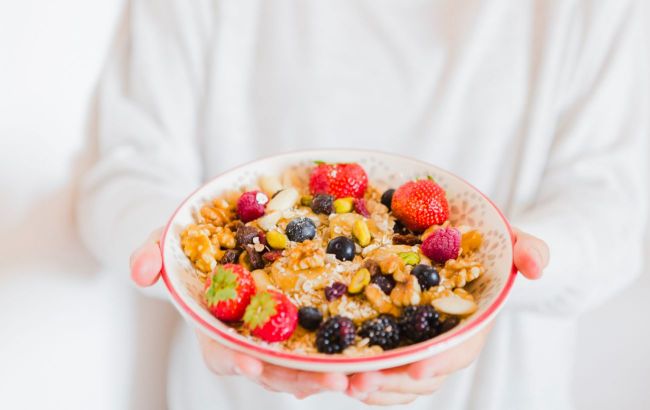How to make your oatmeal protein-packed: 7 must-add ingredients
 Foods that boost the protein content of oatmeal (photo: Freepik)
Foods that boost the protein content of oatmeal (photo: Freepik)
Regular oatmeal can become a true protein superfood—you just need to add a few simple ingredients. They can transform your morning porridge into a nutritious and filling breakfast that provides energy for the entire day, reports Verywell Health.
Milk
The easiest way to increase the protein in oatmeal without significantly changing its taste is to cook it with milk instead of water. This simple swap adds creaminess and provides an additional 8 g of protein.
A cup of cooked oatmeal provides about 6 grams of protein, with milk adding an extra 8 grams.
Fats in milk also help absorb fat-soluble vitamins (A, D, E, K), especially when you add nuts or berries.
If milk causes bloating or discomfort, consider:
- Lactose-free milk
- Plant-based alternatives (oat, almond, soy)
Milk slightly raises the glycemic load, so for people with diabetes or insulin resistance, it’s better to choose partially skimmed or low-fat milk rather than whole milk.
Nuts
You can add almonds, walnuts, pecans, or any other nuts you like to oatmeal. Whole or chopped nuts can increase the protein content and add a crunchy texture.
Oatmeal contains approximately 10-13 g of protein per 100 g of dry product, depending on the variety. Nuts (such as almonds, walnuts, hazelnuts) add 15-25 g of protein per 100 g, along with valuable fats and micronutrients.
Seeds
Seeds are another source of protein, though the amount depends on the type used.
They significantly boost the protein value of oatmeal, especially pumpkin, sunflower, or chia seeds. Combining several types provides a more complete amino acid profile. Adding 20 g of pumpkin seeds can double the protein content in a serving.
Greek yogurt
Greek yogurt contains about 9-10 g of protein per 100 g (plain, without additives). Adding 150 g of Greek yogurt to a portion of oatmeal (about 200 g cooked) increases total protein from 6 g to over 20 g, making the meal much more nutritious and filling.
Benefits of this combination:
- Increases complete protein content (all essential amino acids)
- Improves texture and taste (yogurt makes the porridge creamy)
- Protein and fat from yogurt slow carbohydrate absorption, keeping you fuller longer
Tofu
Oatmeal doesn't have to be sweet. You can add tofu or even cheese to savory oatmeal for extra protein. Tofu is versatile and can be prepared in any form.
For example, adding 100 g of tofu to 50 g of oatmeal (a breakfast portion) provides 14-15 g of protein in total.
Cheese
Cheese contains about 15-20 g of protein per 100 g and is a source of complete animal protein, which includes all essential amino acids.
Adding cheese to oatmeal:
- Increases total protein content
- Makes the amino acid profile complete
- Makes the dish more filling due to protein and slowly digested casein
For example, 100 g of cooked oatmeal with cheese contains about 19.5 g of protein.
Protein powder
Protein powder can be useful because it mixes well with oatmeal. One scoop (30 g) adds 20-25 g of protein, depending on the type (whey, plant-based, etc.).
Add the powder after cooking or once the oatmeal has cooled slightly to avoid protein curdling. It pairs well with fruits, nuts, chia seeds, or peanut butter.
This material is for informational purposes only and should not be used for medical diagnosis or self-treatment. Our goal is to provide readers with accurate information about symptoms, causes, and methods of detecting diseases. RBС-Ukraine is not responsible for any diagnoses that readers may make based on materials from the resource. We do not recommend self-treatment and advise consulting a doctor in case of any health concerns.

